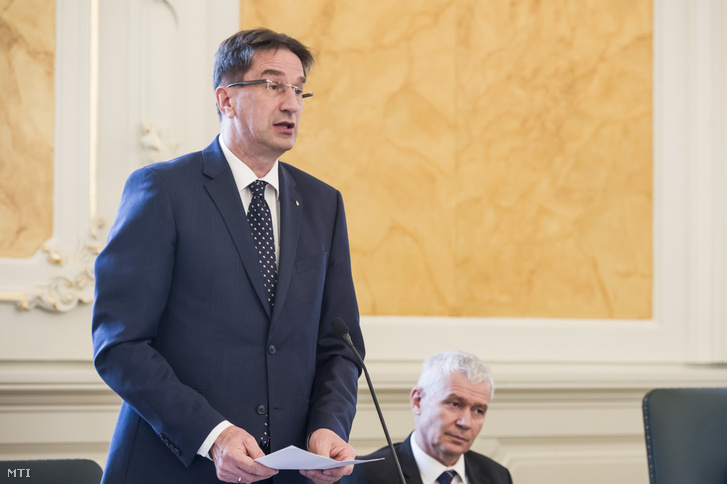Jurisdiction of controversial Hungarian administrative court system remains a mystery
The new administrative courts are yet to be set up, however, the Parliament's Fidesz-majority has already made some changes to the regulation on Monday as a response to criticisms about the lack of checks and balances, but the details of this new court system are still a bit hazy. What do we know so far?
- What cases will be under the jurisdiction of the new courts?
- Who will become administrative judges?
- Who will have the courage to seek remedy against ministerial decisions?
- Who will be the leader of the administrative court system?
- What will be the rules of procedure?
As of yet, these questions do not have a clear answer, but the new administrative courts will start their operation in 2020. Before we look into the most important questions and assess why Fidesz needed to change the new law already, let's summarise the effects this new court will have on the daily life of Hungarians.
Anyone can be involved in a legal dispute, but sometimes the other affected party is not a neighbour, a business partner, or a family member but the state itself. When people disagree with a decision of a state authority, such as a fine from the Tax Authority, a decision about one's eligibility for pension, or a merger stopped by the Competition Authority, the final remedy is the judicial review.
That final say had thus far belonged to the court system, however, a new law passed at the end of last year created a new, parallel court system to decide in these matters, and the jurisdiction of these courts and the independence of its judges from the government in charge of state authorities are not negligible questions.
What cases will be under the jurisdiction of the new courts?
As the detailed regulation on the jurisdiction is not yet public, this is the first hazy point in the new system.
- Statements made so far make it likely that the administrative courts will decide on cases about public procurements, constructions, environmental issues, pensions, taxes, and energetics,
- and these courts will have the final say on the legality of protests, and
- according to background information and earlier statements, the administrative courts will also settle election disputes and decide if a state organisation has to publish certain pieces of public data.

We still don't know if the administrative jurisdiction will extend to cases filed against the press, but the jurisdiction of the Hungarian Royal Administrative Courts did, and Minister of Justice László Trócsányi often refers to that abolished system as a historic example to the administrative courts introduced now, as administrative courts are not without precedent in Hungary; they existed until 1949 when the communist regime abolished them, as that regime made remedies against the state redundant.
The cases listed above have one thing in common: they are all politically sensitive.
For instance, judicial reviews of election disputes can prompt political disputes at the highest levels. Last year, after Hungary's general elections, Viktor Orbán foreshadowed what was to come: after a decision of the Curia (Hungary's supreme court) took a parliamentary seat away from Fidesz, Orbán said that the judicial body interfered in the election and it is "not intellectually mature enough to fulfil its task." The decisions determining the legality of a protest can also be subject to political arguments, and as for the economy, the decisions companies can expect in tax or competition cases can also be significant weapons in the hand of politics.
Who will become administrative judges?
The abovementioned reasons more than justify a closer look at the minister's influence on the recruitment process of judges. As the Hungarian proverb referring to the usual pose on religion icons goes, every saint's arm bends towards themselves (meaning everyone has an eye on their own interests), and that is especially true if one is not a saint, but a politician. With that in mind, it is better to avoid situations in which judges are dependent on the minister, even during the recruitment process.
Basically, there are two ways one will be able to become a part of the administrative judiciary that will count approximately 300 members (their final number will be decided by the minister during the summer, this is merely an educated guess). Those already adjudicating administrative cases can make a statement if they request their transfer to the new system until 30 April 2019, the remaining places are to be filled up by way of tendering. These tenders will be open not only to judges but to those working in public administration as well.
As of yet, the number of judges requesting their transfer is unknown, just like the fate of those who do not make that request. Rumour has it that most judges working with administrative cases have requested their transfers, therefore approximately two thirds of the new administrative judiciary will consist of judges who have been judges before, but others say that number is around a 100 so far, and the rest of the places will have to be filled by administrative professionals - and the minister will have a significant say in that matter.
Who will have the courage to seek remedy against ministerial decisions?
This is the most criticised part of the original government plans. The unamended law would have put the list of those applying for judicial positions in the hand of the minister to choose who gets to be a judge and who does not, which is why members of the opposition dubbed the new legal forum "Fidesz-courts." But as this provision was subject to the criticism of the Venice Commission as well, some Fidesz MPs (including state secretary of justice Pál Völner) have put forth a proposal (passed on Monday) that more-or-less puts a damper on the minister's discretionary powers on the matter.

Monday's amendment did not reassure the opposition
Fidesz MPs Csaba Hende, Pál Völner, Gergely Gulyás, and Zsolt Nyitrai had submitted their proposal to amend the act on administrative courts just a few days before the Venice Commission would have published their criticism. The proposal was an obvious answer to the complaints concerning judicial independence, made evident by its title: "on the further guarantees ensuring the independence of administrative courts."
During the proposal's general debate, Csaba Hende said that by complete compliance with the suggestions of the Venice Commission, the administrative court system to be set up by 1 January 2020 will be fully capable of fulfilling its main purpose.
Andrea Varga-Damm of Jobbik noted that the proposal somewhat fixes exactly the parts of the original law that the opposition raised as problems. She objected the remedy open to unappointed judicial candidates, as the amendment sets objective criteria for appealing the minister's subjective decision.
József Tóbiás of MSZP said it is commendable that the government had heard the suggestions of the Venice Commission and started to integrate them into the proposal, but adopting just a few of the suggestions is not enough. "We need a proposal that introduces real guarantees of judicial independence."
Erzsébet Schmuck of LMP welcomed several sections included in the amendment, however, she said that the problem lies in what was omitted from the proposal. LMP would like to see conflict of interest measures ruling out the judicial appointment of those who have participated in party politics in the five years preceding their appointment.
The new provisions give more detailed, measurable and objective criteria for the selection of applicants for judicial and judicial leadership positions, and also oblige the minister to explain the reasons in case he or she wants to diverge from the ranking determined by the National Council of Administrative Judges. What is more important is the remedy provided for those not included on that ranking: these applicants can seek the remedy of the court, though it's a good question who will have the courage to do that and what they can accomplish.
But this latter rule is only effective as of 2020, therefore it does not apply to the judges and judicial leaders appointed this year, but the makeup of the Council's staffing committee that is in charge of the substantial decisions on the ranking had also been changed to include more judges compared to non-judicial members (7 to 4), and judges get to elect six of the members from their own ranks.
This committee will also be in charge of initiating disciplinary action against Council members and judicial leaders appointed by the minister.
Who will be the leader of the administrative court system?
It's also important to know who will get to lead the Supreme Administrative Court (the new system will mirror the regular court system as there will be regional courts and one supreme court that adjudicates cases from the whole country). The President of the Republic will have to make his recommendation until this June, and the Parliament will have to vote to appoint the president.
Earlier rumours make András Patyi, the former head of the National Public Service University and National Election Committee the most likely candidate. He resigned from all his positions last year and has since been adjudicating administrative cases at the Curia.

A few weeks ago another rumour started making the rounds though, but András Zs. Varga, a constitutional judge and the former dean of the Faculty of Law and Political Sciences at the Pázmány Péter Catholic University, has denied allegations of his rumoured candidacy saying "I do not and have never endeavoured to attain the presidential position of the Supreme Administrative Court or any other official positions for that matter."
What will be the rules of procedure?
As no amendment to the rules of procedure for administrative adjudication accommodating the newly established court system has yet been proposed, the details of the rules by which the procedures are to be carried out by the new administrative courts are hazy as well. We have sent our questions about this to the Ministry of Justice, but they are yet to comment.
The current system of remedies demands the exhaustion of administrative remedies before a case can be heard by the courts, meaning one has to appeal to a higher administrative authority (if there is an administrative second degree) before proceeding to file an administrative lawsuit against a decision. It is not completely out of the question that the administrative appeal will be abolished, rendering courts the only available legal remedy for a disputed administrative decision.
The practical importance of this lies in the fact that such a measure would change the nature of judicial work, as clarification of the facts of the case would require a completely different organisation of procedure would the task befall the new court system.
Update: The Ministry of Justice told us that the questions surrounding the jurisdiction of the new court system will be settled by an omnibus bill to be revealed at the end of the summer, and that the rules of procedure will not be recodified and will mostly remain the same except for a few "necessary, minor modifications."
Hungarian Helsinki Committee still critical
The Hungarian Helsinki Committee issued a statement after the Parliament passed the amendment in question on Monday, in which they note that:
- The law still permits situations in which judges adjudicate decisions of state organisations that used to employ them as short as six months earlier.
- Inexperienced judges will get to hear cases. Currently, judges can hear cases after years of studying and practice at the court, this will no longer be a requirement for administrative judges, and that could negatively affect the quality of the decisions.
- The Minister of Justice claims 300 judges will be necessary for operating the new judicial system, however, according to the president of the Curia, only 120 judges requested their transfer. The remaining 180 places are in the hands of the minister, meaning two-thirds of the new judiciary could be picked by the executive branch.
- Nothing stops the government from filling all the remaining places with former public administration employees.
- The flaws of the regulation are well illustrated by the fact that it allows the appointment of someone with no judicial experience whatsoever as President of the Supreme Administrative Court.
This article is a direct translation of the Hungarian original published by Index.

Support the independent media!
The English section of Index is financed from donations.
Az oldalról ajánljuk
- FOMO
L.L. Junior öt év múlva abbahagyhatja a zenélést
A zenei élet mellett a tévét is maga mögött hagyná a rapper.
február 21., 08:30
- Belföld
Orbán Viktor óriási bejelentéseket ígért szombatra
A miniszterelnök fontos megállapításokat tett a magyar gazdaság helyzetéről.
február 21., 07:38
- Gazdaság
Baljós hírek érkeztek Németországból
A kis cégek nehezen viselik a bürokratikus terheket.
február 21., 08:28
- Külföld
Emmanuel Macron figyelmeztette Donald Trumpot: nem lehetsz gyenge Putyinnal szemben!
A francia elnök hétfőn találkozik amerikai kollégájával.
február 21., 07:27
- Belföld
Szijjártó Péter: Hétfőn blokkolunk
Megakadályoznak mindent, ami a tárgyalásokat nehezíthetné.
február 21., 08:19
- Kultúr
A Måneskin menedzsere új csillagot talált, a közönség máris odavan érte
Olly nevét érdemes megjegyezni.
február 21., 08:12
- Futball
Őrült meccs a Spanyol Kupában, a Barca kétgólos hátrányból fordított, mégsem nyert
A katalánok már 48 másodperc után gólt kaptak, de ez még csak a jéghegy csúcsa volt.
tegnap, 23:29
- Belföld
Ruszin-Szendi Romulusz 928 millió forintos szolgálati villát építtetett
Megpróbáltuk kideríteni, miért távolították el Ruszin-Szendi Romulusz altábornagyot a Honvéd Vezérkar éléről.
február 21., 07:29
- Vélemény
Koporsószeg vagy mászókötelet rögzítő szegecs lesz az EU új hétéves költségvetése számunkra?
Most kellene tökösebb európai kiállást követelnie azoknak, akik szlogenként harsogták: „Make Europe great again!”
február 21., 07:57
- Kultúr
Amerikában vetett véget életének, de Budapest volt az igazi szerelme
Ő mondta azt is, Budán lakni világnézet.
február 21., 08:11
- Sport
Megszületett az ítélet Luis Rubiales csókjának ügyében
Az egyik vádpontban bűnösnek találták a spanyol labdarúgó-szövetség volt elnökét.
február 21., 08:55
- Gazdaság
Hernádi Zsolt figyelmeztet: Európa egyre nehezebb helyzetben találhatja magát
Komoly problémákkal küzd a kontinens a Mol-vezér szerint, túlzottan erőlteti az olajipari átállást.
február 21., 08:41
- Külföld
Újabb híreket közölt a Vatikán Ferenc pápa állapotáról
A katolikus egyházfő még februárban kapott kétoldali tüdőgyulladást.
február 21., 09:00
- Kultúr
Játéknak álcázzák, mégis kőkemény társadalomkritika
Molnár Judit Lilla Kígyók és Létrák című installációja fontos témát feszeget.
február 21., 06:51
- Belföld
Orbán Viktor támadással és „jó hírekkel” készül, a célpontokat is kijelölte
Reagál a miniszterelnök a Ruszin-Szendi Romulusz-ügyre az évértékelőjén?
február 21., 05:46
- Külföld
Ez történne, ha Ferenc pápa meghalna
A jezsuiták reformpápájának temetési szertartása eltér majd az évezredes hagyományoktól.
február 21., 05:46
- FOMO
Medveczky Ilona vallomása: igaznak hitt barátot veszített el a pénz miatt
A díva elmondta: nincsenek igazi barátnői.
február 21., 07:15
- Külföld
Vlagyimir Putyin sokkal rutinosabb játékos, az ujja köré fogja csavarni Trumpot
Hosszú elemzést közölt a témában a The Economist című lap.
február 21., 06:12
- Külföld
Őrizetbe vették a Sinaloa-kartell egyik fejesét
A „200-as” becenévre hallgató férfi felelt a szervezet vezetőinek biztonságáért.
február 21., 06:48
- Külföld
Majomhimlővel fertőzött páciensek százai menekültek el a kórházakból
Egyre nagyobb a pánik a Kongói DK-ban.
február 21., 06:34
- Cinematrix
Önkívületi állapotban a rajongók, már idén nyáron foroghat a Dűne harmadik része
Timothée Chalamet és Zendaya is visszatérhet Magyarországra.
február 21., 06:08
- Külföld
Donald Trump: Putyin szeretne megállapodást kötni a háborúról, pedig megszerezhetné egész Ukrajnát
február 21., 06:04
- Gazdaság
Kiderült, mibe érdemes most fektetni, ha nagyot akarunk kaszálni
Részletes felmérés látott napvilágot a jelenlegi helyzetről.
február 21., 06:24
- Kultúr
Szexelhet-e egy idősebb nő egy nála fiatalabb férfival?
Főleg, ha még fizet is érte.
február 21., 06:02
- Külföld
Izrael kíméletlen csapást mért, véget érhet a tűzszünet
A szíriai–libanoni határon hajtott végre támadást a hadsereg.
február 21., 06:48
- Tech-Tudomány
Több mint 100 év után újabb ókori egyiptomi fáraó sírját sikerült feltárni
Tutanhamon után II. Thotmesz sírjába is betekintést nyerhetünk.
február 21., 06:04
- Külföld
Két gyilkosság miatt tartóztattak le egy magyar férfit Floridában
A 25 éves magyar férfi a gyilkosságok mellett fegyveres rablásban is részt vett a gyanú szerint.
február 21., 07:03
- Belföld
Meg akarta késelni szomszédját egy tapolcai férfi, amiért lefeküdt a feleségével
„Várom a kontyos nagy orrút” – felelte, amikor késsel a kezében kérdőre vonták.
február 21., 09:23





























